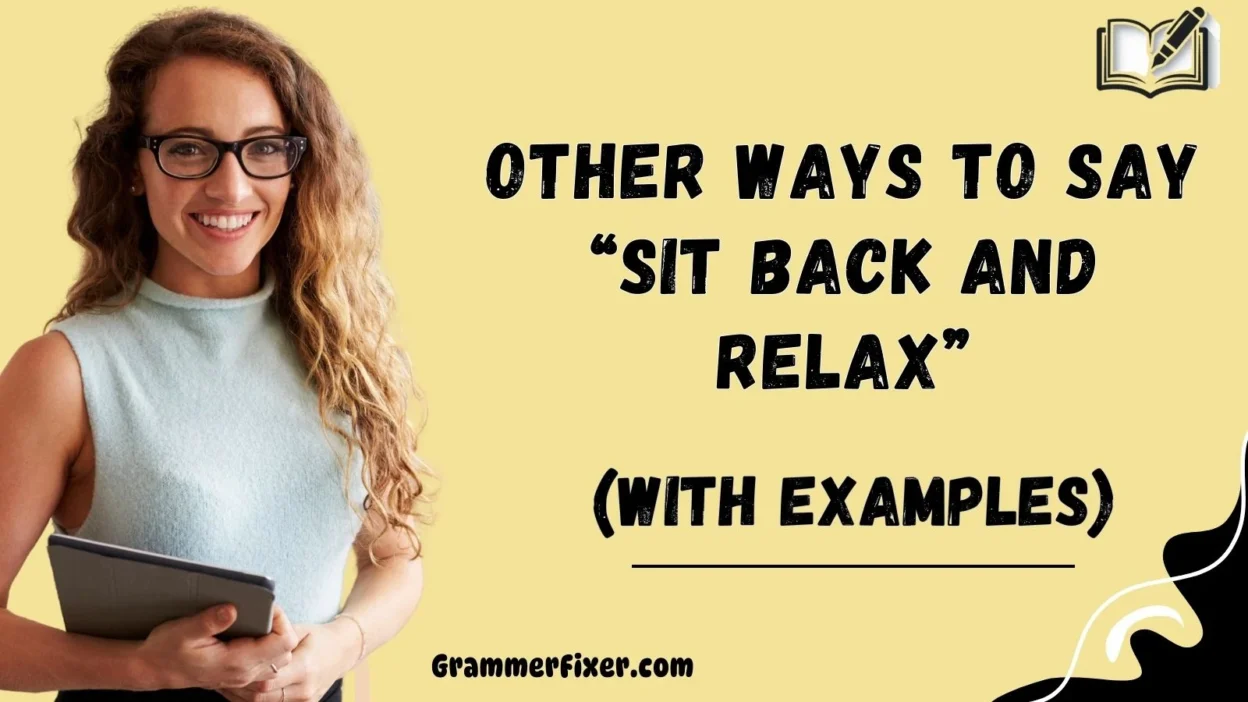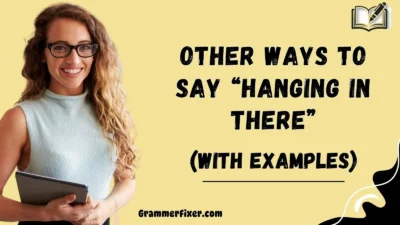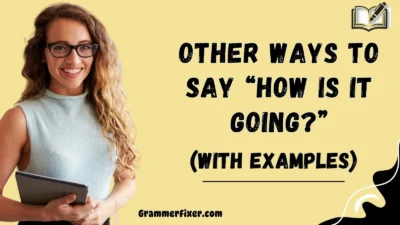Finding the right words to express care, warmth, and reassurance can transform even the simplest phrase into something more personal and meaningful. While “Sit Back and Relax” is a classic expression, it can sometimes feel overused or unoriginal. If you want to encourage someone to take a break, let go of stress, or simply enjoy the moment, there are many alternatives that capture the same sentiment in fresh and heartfelt ways.
This guide explores 30 other ways to say “Sit Back and Relax”, with examples, best contexts, and tones, helping you choose the right words for friends, family, colleagues, or professional settings.
What Does “Sit Back and Relax” Mean?
The phrase “Sit Back and Relax” means to let go of tension, stop working, and allow yourself to rest or enjoy the moment.
It can be literal—like leaning into a chair—or figurative—like telling someone to stop worrying about something.
When to Use “Sit Back and Relax”?
You can use it when you want to:
- Encourage calmness after a stressful day.
- Invite someone to take a break from work, chores, or responsibilities.
- Create a welcoming, comforting atmosphere in hospitality or casual settings.
- Reassure someone that everything is under control.
Is It Professional/Polite to Say “Sit Back and Relax”?
Yes—in most contexts. It’s friendly, casual, and polite. However, in professional or formal environments, you may prefer gentler alternatives like “Please feel free to take it easy” or “You can rest assured”.
Pros or Cons of Using “Sit Back and Relax”
Pros:
- Universally understood.
- Warm and casual.
- Encouraging and positive.
Cons:
- Sometimes feels generic or cliché.
- Not always suitable for formal communication.
- Can sound dismissive if used in the wrong tone.
1. Take It Easy
Meaning: A casual way of saying don’t stress and go at a gentle pace.
Explanation: Common in both personal and professional contexts, it’s one of the most universal alternatives.
Example:
- “You’ve done enough today—take it easy this evening.”
Best Use: Everyday situations, casual advice, friendly notes.
Worst Use: High-pressure professional settings where more formality is needed.
Tone: Friendly, relaxed, encouraging.
2. Unwind
Meaning: To release tension and gradually move into a calmer state.
Explanation: Often associated with de-stressing after a long day or week.
Example:
- “After that meeting, you deserve to just unwind with some music.”
Best Use: End-of-day conversations, wellness advice.
Worst Use: Urgent situations that require immediate focus.
Tone: Calming, modern, supportive.
3. Chill Out
Meaning: To relax in a laid-back way, often with friends or in casual settings.
Explanation: A youthful, modern phrase that can be playful but sometimes blunt.
Example:
- “Come over this weekend—we’ll just chill out by the pool.”
Best Use: Informal conversations with peers, younger audiences.
Worst Use: Professional or formal situations.
Tone: Playful, informal, fun.
4. Chillax
Meaning: A blend of “chill” and “relax”, emphasizing casual comfort.
Explanation: Popular in modern slang, often playful and lighthearted.
Example:
- “You’ve been working non-stop—time to chillax with a good show.”
Best Use: Texts, casual chats, lighthearted moments.
Worst Use: Business emails, formal hospitality.
Tone: Humorous, casual, youthful.
5. Kick Back
Meaning: To sit comfortably and take a break, often with leisure activities.
Explanation: Suggests leaning back and letting go of stress.
Example:
- “Grab a drink and kick back by the fire.”
Best Use: Social gatherings, hospitality, casual invitations.
Worst Use: Situations requiring seriousness or urgency.
Tone: Relaxed, social, inviting.
6. Put Your Feet Up
Meaning: A literal action that symbolizes resting and relaxing.
Explanation: A warm, homey phrase often used after a long day of work.
Example:
- “You’ve earned it—go home and put your feet up.”
Best Use: Comforting personal conversations.
Worst Use: Younger, slang-oriented contexts.
Tone: Nurturing, empathetic, home-like.
7. Loosen Up
Meaning: To let go of stiffness, stop being tense, or relax socially.
Explanation: Can refer to physical relaxation or being less rigid emotionally.
Example:
- “Don’t worry about perfection—just loosen up and enjoy the evening.”
Best Use: Encouragement in casual, creative, or social settings.
Worst Use: Situations involving serious stress or anxiety disorders.
Tone: Encouraging, informal, slightly directive.
8. Decompress
Meaning: To release built-up stress and restore mental or physical calm.
Explanation: Often used in wellness, therapy, or recovery contexts.
Example:
- “After finals, students need time to decompress.”
Best Use: Self-care, therapy, wellness advice.
Worst Use: Very casual chats—it can sound too clinical.
Tone: Supportive, health-focused, professional.
9. Settle In
Meaning: To get comfortable in a new place and allow yourself to relax.
Explanation: Common in hospitality, travel, and welcoming settings.
Example:
- “Please, settle in—make yourself at home.”
Best Use: Hospitality, welcoming guests, customer service.
Worst Use: Informal slang contexts.
Tone: Warm, inviting, hospitable.
10. Calm Down
Meaning: To reduce stress, anxiety, or agitation.
Explanation: Direct and sometimes necessary, but must be used with care.
Example:
- “Take a few deep breaths—it’s okay, just calm down.”
Best Use: Supportive reassurance during stress.
Worst Use: Arguments, as it can feel dismissive.
Tone: Gentle if used kindly; harsh if said bluntly.
11. Melt Into the Moment
Meaning: To fully embrace the present and allow yourself to feel comfort and calm.
Explanation: This phrase is poetic and mindful, often linked with meditation or relaxation practices.
Example:
- “As you listen to the waves, just melt into the moment.”
Best Use: Mindfulness, wellness retreats, guided meditation.
Worst Use: Casual conversations—it can feel too formal or spiritual.
Tone: Reflective, soothing, poetic.
12. Let Your Hair Down
Meaning: To stop being formal and allow yourself to be more carefree.
Explanation: A playful, familiar phrase, often linked to fun and leisure.
Example:
- “It’s the weekend—time to let your hair down and dance!”
Best Use: Social events, weekend plans, casual fun.
Worst Use: Professional settings—it feels too informal.
Tone: Playful, relaxed, lively.
13. Find Your Zen
Meaning: To enter a calm, balanced, and peaceful state of mind.
Explanation: Inspired by Eastern philosophy, this phrase blends modern casualness with spiritual undertones.
Example:
- “After such a hectic week, I just need to find my Zen.”
Best Use: Wellness, yoga, meditation, self-care contexts.
Worst Use: Formal business communication.
Tone: Calming, spiritual, modern.
14. Lounge Around
Meaning: To rest casually, often with no specific activity planned.
Explanation: Suggests a lazy, comforting, stress-free environment.
Example:
- “We’ll just lounge around the house on Sunday.”
Best Use: Casual weekends, personal invitations, relaxing at home.
Worst Use: Professional settings, formal invitations.
Tone: Laid-back, easy-going, casual.
15. Lay Back
Meaning: To physically recline and take a moment of rest.
Explanation: Suggests a literal position of comfort that encourages both physical and mental ease.
Example:
- “Just lay back, close your eyes, and listen to the music.”
Best Use: Hospitality, spa settings, comfort-based advice.
Worst Use: Serious or formal situations.
Tone: Gentle, nurturing, calm.
16. Take a Breather
Meaning: To pause briefly and regain energy or calmness.
Explanation: Implies a short break, especially during a busy day or stressful situation.
Example:
- “Let’s take a breather before we move on to the next task.”
Best Use: Work-life balance, stress relief, team encouragement.
Worst Use: Long-term rest contexts—it implies only a temporary pause.
Tone: Supportive, practical, refreshing.
17. Drift Away
Meaning: To gently let go of worries and allow yourself to fade into comfort or imagination.
Explanation: Often associated with daydreaming, sleep, or calm music.
Example:
- “Close your eyes and just drift away with the melody.”
Best Use: Sleep meditation, poetic or artistic writing.
Worst Use: Professional, business, or directive communication.
Tone: Dreamy, poetic, soothing.
18. Soak It In
Meaning: To immerse yourself fully in the present experience or environment.
Explanation: Suggests enjoying the moment to its fullest.
Example:
- “Sit by the lake and just soak it in.”
Best Use: Travel, nature, special occasions, wellness.
Worst Use: When quick action is needed—it implies slowing down deeply.
Tone: Appreciative, mindful, immersive.
19. Float Away
Meaning: To let your worries dissolve and feel like you’re carried by peace.
Explanation: A figurative phrase often used in spa, resort, or meditation contexts.
Example:
- “As you enter the warm bath, allow yourself to float away.”
Best Use: Spa promotions, wellness writing, poetry.
Worst Use: Direct advice in business or casual slang—it may sound too abstract.
Tone: Gentle, imaginative, nurturing.
20. Breathe Easy
Meaning: To let go of anxiety and feel safe, reassured, and comfortable.
Explanation: A phrase that ties physical breathing with mental calm.
Example:
- “The project is complete—you can finally breathe easy.”
Best Use: Reassurance, after stressful events, professional encouragement.
Worst Use: Party invitations—it’s not playful enough.
Tone: Reassuring, empathetic, calming.
21. Ease Up
Meaning: To slow down, reduce effort, or let go of pressure.
Explanation: Often used when someone is being too intense or stressed and needs to relax.
Example:
- “You’ve been working non-stop—time to ease up a little.”
Best Use: Friendly advice, workplace encouragement, casual reminders.
Worst Use: Serious situations where effort is still required.
Tone: Supportive, casual, gentle.
22. Enjoy the Moment
Meaning: To focus on the present and take in what’s happening without worry.
Explanation: Encourages mindfulness and gratitude in everyday life.
Example:
- “Forget about tomorrow—just enjoy the moment tonight.”
Best Use: Travel, special occasions, motivational notes.
Worst Use: Quick, casual chats—it feels more meaningful and deep.
Tone: Inspirational, warm, reflective.
23. Sink Into Comfort
Meaning: To allow yourself to physically and mentally relax into a comfortable state.
Explanation: Conveys the imagery of soft chairs, cozy blankets, or safe spaces.
Example:
- “Grab a cup of tea and sink into comfort.”
Best Use: Hospitality, wellness, home settings.
Worst Use: Business communication—it feels too cozy and personal.
Tone: Nurturing, homey, gentle.
24. Lounge in Peace
Meaning: To rest calmly without disturbance.
Explanation: Combines the ideas of casual lounging with a sense of tranquility.
Example:
- “The garden is the perfect place to lounge in peace.”
Best Use: Vacation, hospitality, spa retreats.
Worst Use: Direct commands—it’s too poetic for urgency.
Tone: Relaxed, serene, inviting.
25. Rest Easy
Meaning: To relax without worry because things are safe and under control.
Explanation: Can mean peace of mind as well as physical rest.
Example:
- “Your package is secure—you can rest easy.”
Best Use: Professional reassurance, customer service, supportive notes.
Worst Use: Casual hangouts—it feels too formal.
Tone: Polite, reassuring, calming.
26. Take a Load Off
Meaning: To remove burdens and rest after a tiring effort.
Explanation: A very colloquial, homey phrase often used with friends and family.
Example:
- “Come in, sit down, and take a load off.”
Best Use: Friendly gatherings, home comfort, casual talks.
Worst Use: Professional settings—it sounds too folksy.
Tone: Warm, inviting, casual.
27. Recline and Rest
Meaning: To physically lie back and allow the body to recover and relax.
Explanation: Suggests a more formal or structured way of describing relaxation.
Example:
- “Just recline and rest while we bring your meal.”
Best Use: Hospitality, spa, wellness contexts.
Worst Use: Informal slang—it feels slightly formal.
Tone: Polite, caring, professional.
28. Take Five
Meaning: To pause briefly for a quick break.
Explanation: Often used in workplaces, performances, or casual team settings.
Example:
- “We’ve been working hard—let’s take five before continuing.”
Best Use: Professional breaks, teamwork encouragement.
Worst Use: Long-term relaxation contexts—it only implies a short pause.
Tone: Casual, supportive, efficient.
29. Slow Down
Meaning: To reduce pace and adopt a gentler rhythm.
Explanation: Encourages less rushing and more intentional living.
Example:
- “You don’t need to rush—just slow down and enjoy your meal.”
Best Use: Stressful moments, wellness writing, gentle advice.
Worst Use: Fun, upbeat party contexts—it feels more serious.
Tone: Gentle, caring, sometimes cautionary.
30. Drift Into Stillness
Meaning: To let yourself move toward deep calm and inner peace.
Explanation: Poetic and deeply meditative, this phrase blends imagery of quietness and serenity.
Example:
- “Close your eyes, breathe, and drift into stillness.”
Best Use: Guided meditation, poetry, reflective writing.
Worst Use: Everyday chat or workplace—it’s too abstract.
Tone: Spiritual, poetic, reflective.
Conclusion
Finding the right words to express care, comfort, and encouragement matters. While “Sit Back and Relax” is familiar and warm, these 30 alternatives offer fresh, diverse, and meaningful ways to connect—whether you’re writing to a loved one, speaking to a friend, or even addressing colleagues or customers.
- Some phrases like “Take it Easy” and “Unwind” are casual and universal, perfect for everyday use.
- Others like “Rest Easy” or “Settle In” add professional warmth and fit in hospitality or workplace contexts.
- More poetic options like “Melt Into the Moment” or “Drift Into Stillness” add emotional depth and are ideal for mindfulness, wellness, and writing.



